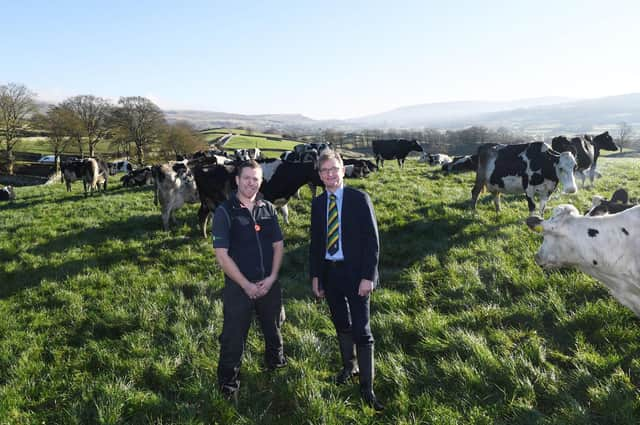Yorkshire Dales vet awarded prestigious scholarship to "find out the facts" on how dairy farms can reach net zero


With farming often portrayed as a climate change problem, rather than part of the solution, Miles Middleton who lives on the family farm in Askrigg, is keen to find out the facts and gain a better understanding of how dairy farmers can manage their herds to maximum benefit for both the environment and food production.
The 36-year-old has been selected for a Nuffield Farming Trust Scholarship, sponsored by the Yorkshire Agricultural Society and will study the challenges of reaching net zero.
Advertisement
Hide AdAdvertisement
Hide Ad“There is a lot of dogma and mistruth talked about farming and climate change but when we take the time to look at it properly, there are a lot of interesting trade-offs that are not widely recognised or understood,” Miles said.
“We all know that ultimately, there is an absolute requirement to produce food, and there is a finite amount of farmland.
Farms could reduce their carbon output by moving out of cattle, but we are forgetting about all the production required to feed an ever-growing population. The food we derive from cattle would have to be replaced by food coming from somewhere else, and what would be the carbon costs of being reliant on imported food?”
Miles’ year-long scholarship, entitled ‘Working Towards Net Zero in the Dairy Sector; trade-offs, opportunity costs and alternative allocations for scarce resources’, will see him visit a variety of dairy farming businesses in different parts of the world to evaluate the opportunities, challenges, strategies, and trade-offs facing the industry as pressure mounts to reduce emissions globally.
Advertisement
Hide AdAdvertisement
Hide AdThe Government has set a target for the UK to achieve net zero greenhouse gas emissions by 2050, and the National Farmers Union has set an ambitious goal for the whole of agriculture in England and Wales to meet the same target a decade earlier.
Miles, who will present his findings in a formal research paper, said: “Dairy farming has been my passion all my life. I’m interested in the different grazing systems, the contrasts between high input and grass-based systems and the variety within the dairy sector, as well as cattle nutrition and the causes of lameness.”
Miles grew up on and lives at Skelgill Farm in Wensleydale. His family has farmed the land for more than eight generations and it is now run by his brother Alan.
The 92-hectare farm is home to 80 dairy cows run on an autumn calving system, as well as a flock of 100 white-faced Texel-crossbred hill sheep. Miles said he is passionate about the role British dairy farming can play.
Advertisement
Hide AdAdvertisement
Hide Ad“I do believe that grassland farming in the UK has the potential to be one of the most sustainable and productive systems in the world for food output and carbon sequestration as part of a symbiotic relationship. There is no other industry that has that opportunity.”
During his scholarship, Miles hopes to visit advanced grazing systems in New Zealand and pioneers of the regenerative agriculture movement in North America.
He said: “I’m looking forward to meeting other people with great ideas and challenging my own thinking.”
The Yorkshire Agricultural Society (YAS) has sponsored Nuffield Farming Scholarships for more than four decades.
Advertisement
Hide AdAdvertisement
Hide AdNigel Pulling, YAS chief executive, said: “The Society is continually looking to support the professional development of farmers in Yorkshire and for advancement of the industry.
“Sponsoring a Nuffield Scholar is one way in which we do this, and we are delighted to be supporting Miles whose research will no doubt offer really useful insights for others as the industry strives for the best balance between profitable food production and maximum environmental gain.”